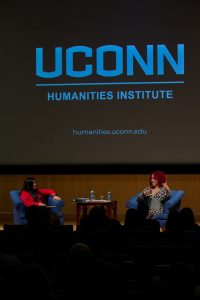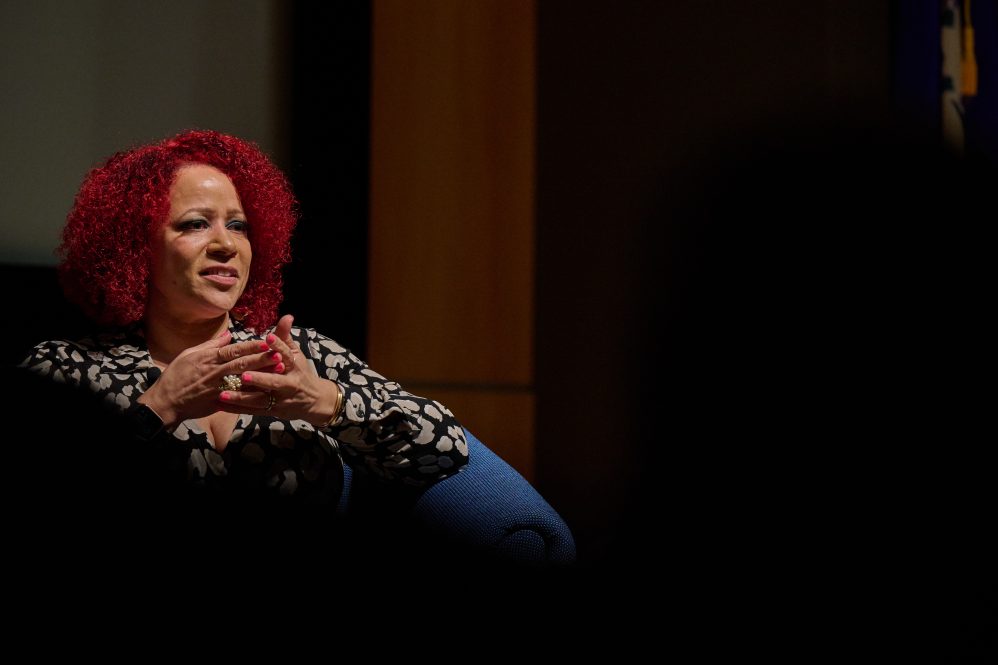Journalist Nikole Hannah-Jones had one goal as a history major at the University of Notre Dame: to not take a single class in European history.
Growing up in Waterloo, Iowa, in the 1980s and ’90s, she heard all about European influences on America and not a word about Black contributions to the birth of a nation. So, when she advanced to college and took her first Black American history class, she pledged to delve only into the stories of other nations, creeds, races, and genders.
“It was like I could breathe for the first time,” she told a UConn audience Wednesday about that initial Black American history class she took.
Before college, she said she assumed Black people hadn’t had any influence on the country and its communities, because no one around her made mention of their contributions. Certainly, her teachers would have said something, she said, because aren’t they supposed to spotlight the most significant historical impacts?
But “we have not had neutral history,” she said. And Black “history has not been part of the standard way we have studied history.”
Since those days, Hannah-Jones has dedicated her career to advocating for people of color and prompting change in how the country discusses race.

On Wednesday, she joined UConn history professor Manisha Sinha for a conversation on producing “The 1619 Project” with The New York Times Magazine, winning the Pulitzer Prize for Commentary during the pandemic, and what being patriotic means to her.
The talk – a capstone event commemorating the 20th anniversary of the UConn Humanities Institute – drew a sizeable crowd to the Student Union Theater, as the line of audience members stretched the length of the building long before the event commenced.
“I think everyone should be cared for in this world, everyone deserves a fair chance,” Daniel Flanagan ’24 (ENG) said as he waited for the program to begin. “I’m interested in learning more about Nikole Hannah-Jones and her work. It looks like she does important work.”
In what Hannah-Jones describes as a “cultural phenomenon,” “The 1619 Project” is a series of articles, essays, and other works that highlight the contributions of Black people and makes the case that slavery influenced the formation of the United States from the outset and continues to play a role in society today.
It was timed to coincide with the 400th anniversary of the first landing of slaves in what was to become America and since has been used to develop school curricula to change the way history is taught.
Hannah-Jones said she couldn’t sleep the night before publication for fear of how it would be received. The New York Times had trouble selling ads in the issue, and there were some companies to which it refused to provide ad space. She wasn’t uneasy about its portrayal of how slavery has shaped society today; she knew a negative reception would stymy continued efforts to make change.
When she saw the mockup of the magazine before it went to print, she “walked into that room and I started sobbing,” she said. “We knew we had created something powerful.”
She heard stories of empty newsstands and non-Times readers seeking out copies. The audience engagement was amazing, she said, but it did come with backlash when a handful of academic historians contended the project contained factual inaccuracies and tried to tarnish the project’s aim.
“This wasn’t just about critique,” Hannah-Jones said. The attacks became personal, weaponized, and wrapped into a national debate and continued struggle on race, she said.
“Often the history we are taught is a history to legitimize power. This is a project that seeks to expose that power for what it is,” she said. “Narrative drives policy and if you start to think about and understand your country differently, then you start to support policy that addresses the country that actually exists not the country we pretend to be.”
Hannah-Jones said she’s had some low points in the three years since the project’s publication. Oftentimes, it’s a random act of kindness that reminds her of the good that’s come from it – like when an 85-year-old white woman from Mississippi contacted her to say she never knew what Black people had done for the country.
Those small moments bring joy, certainly, but winning the Pulitzer Prize brought great joy.
She said she always imagined what winning journalism’s highest honor would be like, how she would feel being applauded by her peers as she strutted through The New York Times newsroom and ascended its grand staircase to receive accolades.
Then, the pandemic hit, and her award was presented much less climactically over Zoom.
It wasn’t what she envisioned, yet it did bring joy.
Her father also found happiness when Hannah-Jones was growing up in flying a large American flag outside the family’s home. She said she was embarrassed by the enormity of the flag that seemed to her to reach 200 feet high but was probably more like 15.
“Patriotism for Black Americans is deeply conflicting,” she said, explaining that she struggles to understand how someone like her father could love a place that’s rejected them at every turn. “There’s no reason we should love this country, but we do.”
Like many in the Jim Crow South, Hannah-Jones said her father enlisted in the Army to escape poverty and told her he didn’t feel like a true American until he left home soil and went overseas. It’s a story she relays in her opening piece of “The 1619 Project.”
“I don’t find patriotism useful in general,” she said. “I think it’s an excuse for a whole bunch of other things.”
But it’s important to note the difference in definitions of patriotism. For many, she said, it’s the feeling that one’s home country can do no wrong. For others, it means to challenge, question, and expose hypocrisy.
“The essay is patriotic,” she acknowledged, “I’m not.”
Wednesday’s event was co-sponsored by the Office of the Provost, the College of Liberal Arts and Sciences, the UConn Foundation, the Neag School of Education, the Africana Studies Institute, the Human Rights Institute, the History Department, and the Journalism Department.



